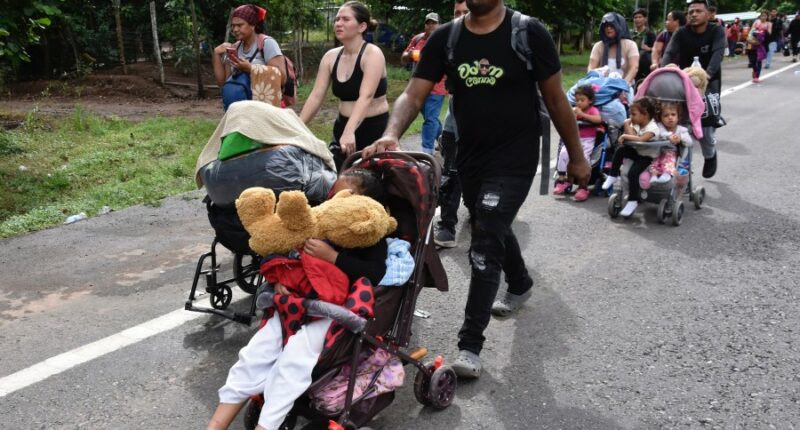Share this @internewscast.com

EL PASO, Texas (Border Report) – As the United States increasingly fortifies its borders, Latin American nations that typically witness their citizens leaving are now assuming the role of hosts for migrants seeking new paths.
These countries, located along the northward journey, often share common languages and cultures with the migrants, generally treating them with compassion. However, they are not equipped to integrate large migrant populations into their economic, educational, or healthcare systems.
According to immigration experts speaking on Monday, this situation necessitates change, especially as the Trump administration considers increasing deportations, potentially causing difficulties for these nations.
“In recent years, the focus has primarily been on the U.S.-Mexico border and the measures that other countries are—or aren’t—taking to assist the United States in curtailing migration from South and Central America as well as the Caribbean,” noted Ariel Ruiz Soto, a policy analyst at the Washington, D.C.-based Migration Policy Institute (MPI). “Yet, there’s limited attention on what these countries are doing for their own migration challenges.”
MPI experts reveal that an estimated 18 million migrants are dispersed across Latin America. This includes hundreds of thousands trapped in Mexico since President Trump halted asylum claims on January 20, along with sizable Venezuelan populations that have sought refuge across the border in Colombia or moved further to Chile.
“The focus has expanded beyond Mexico and Central America to include deportations and removals, which remain significant,” Ruiz explained. “Moreover, it’s worth noting that Mexico received the world’s third-highest number of asylum applications in 2022 and 2023, trailing only Germany and the United States.”
It wasn’t a smooth process, as evidenced by the throngs of people camped in southern Mexican cities like Tapachula or standoffs involving migrant caravans and overwhelmed Mexican National Guard troops.
Organization members on Monday discussed the latest migration trends in the region and the political uncertainty brought about by sudden changes in U.S. policy. Latin American leaders went from being recruited by President Biden to address root causes of migration to President Trump insisting they just take back their migrants.
That undermines trust among Latin American politicians and private sector partners when it comes to going along with the next great American international immigration initiative.
“With the Trump administration approving $170 billion for deportations for the next four years, the region must prepare. We cannot afford to have purely reactive policies once deportations ramp up,” said Diego Chaves-Gonzalez, senior manager for MPI’s Latin America and Caribbean initiative.
The experts said many nations in the hemisphere are “aging.” The median age in Mexico, for example, is 30.8 years compared to 24.8 years in Guatemala, according to the CIA Factbook.
Such older societies could benefit for increased migration – if they come up with a plan to integrate them, to see them as a solution for a shortcoming, instead of as a sudden crisis, experts suggest.











